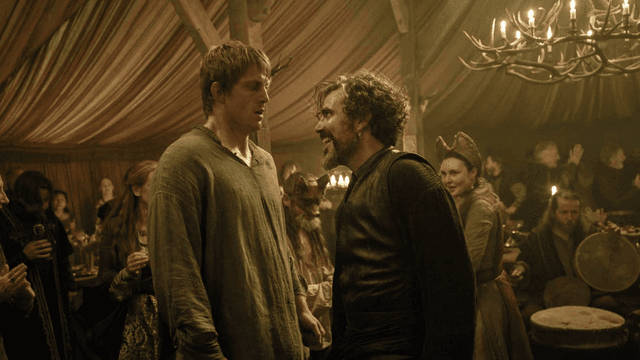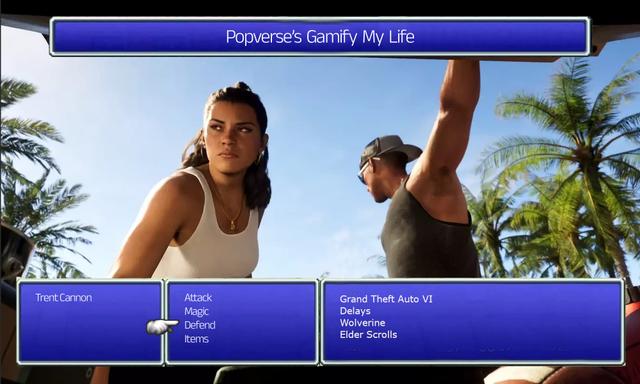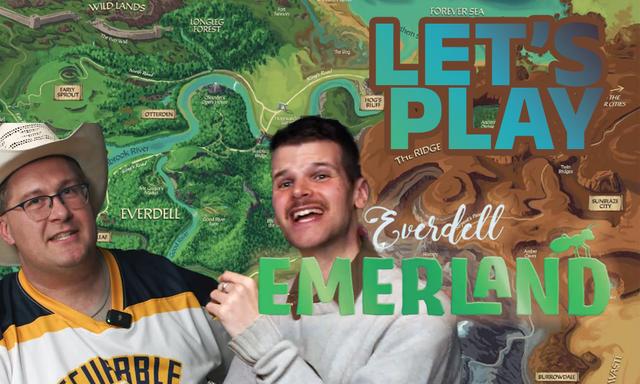If you click on a link and make a purchase we may receive a small commission. Read our editorial policy.
The Witcher: Inside the evolving uses of music in the hit Netflix show and its spinoffs
The Witcher is known for its songs; but the purposes of those songs keeps evolving. And Blood Origin suggests more evolutions to come.

One of the most interesting aspects of The Witcher universe is the way that it thinks about music. When characters sing in The Witcher and The Witcher: Blood Origin, it’s not just to create a vibe, or to entertain. Indeed, as the series has gone on the purpose that music serves keeps evolving.
Here's four purposes that music has served in the Witcherverse, and thoughts on one more to come:
“You Think You’re Safe”: Entertainment
When we first meet the bard Jaskier in episode 102 of The Witcher, he is at an inn singing this song about monsters. The imagery is bland; the rhyming atrocious—he tries to pair “potion” with “abortion.” It does not go well.
But that aural disaster also underlines the first and most obvious purpose of song in Witcher: to entertain. People throw food at Jaskier because his song is not pleasing. It does not help them relax or escape. And in talking to Geralt of Rivia, Jaskier realizes that his problem is that his songs are not grounded in real life. If he wants to craft riveting tales, he needs to get out there with Geralt and actually have some riveting experiences.
“Throw a Coin to Your Witcher”: Persuasion
At the end of that same episode, Jaskier delivers his first season masterpiece, in which he turns a relatively minor incident between he and Geralt and three elves into Geralt overcoming an entire elven army to save his life. The song is filled with drama and visual detail: The elves are led by a “silver-tongued devil;” Geralt fights them “at the edge of the world” and “thrusts every elf/far back on the shelf/high up on the mountain.”
While Jaskier’s goal is obviously to entertain (and get some tossed coins of his own), he's also trying to change public opinion about Geralt. Where everyone knows Geralt as “The Butcher of Blaviken," Jaskier instead calls him “the White Wolf,” the “champion” who saves his life against overwhelming odds, a true “friend to humanity.” And he turns the refrain, the main portion of the tune the crowds will sing, into a call to take care of Geralt. Without them even noticing it, he's got the people telling each other to trust the Witcher.
"Toss a Coin" changes people’s opinions of Geralt seemingly everywhere overnight. Just two episodes later we open on a grieving man telling a rapt crowd the story of how he just saw “the White Wolf” devoured by a monster. When Geralt shows up, covered in blood, Jaskier just sings the tag line and the entire room joins in. With just one earworm-y song, Jaskier has completely rehabilitated Geralt’s reputation.
“Burn, Butcher, Burn”: Self-Expression
More than anything, episode 204’s “Burn Witcher, Burn” is a place setter, showing us what’s become of Jaskier since we left him in 107. As in season one, we begin with him performing. But now he is a star; the ladies are flirting with him, the crowd is singing along. He’s even got his own band.
Meanwhile his song itself tells the tale of his heartbreak over being abandoned by Geralt in season one. “After everything we did, we saw/You turned your back on me,” he sings. “Did you ever even care/With your swords and your stupid hair? (such a great lyric)/Now watch me laugh as I burn all the memories of you.” It’s not a song designed to entertain, really, or to persuade. It’s just him pouring his heart out.
“Whoreson Prison Blues”/”Black Rose”: Inspiration
Near the end of season two of The Witcher, Jaskier delivers a hilarious impromptu song in jail. “So lock me up, and sock me up/and throw away the key,” he sings, “Go fuck yourself, you whoreson/’Cause you’re through fuckin’ with me.”
In large part the song is designed just to piss off his jailors. But it’s also a song about spitting in the eye of oppression. “If I had to do it over,” Jaskier opines, “I”d do it all again/The wind don’t cower to powerful men.” And this very much fits Jaskier’s own growth in season two, and the new dynamics of the world in which he lives. Elves find themselves being hunted to extinction. And a year after making a living singing a song about Geralt killing an army of them, Jaskier has become the head of an underground railroad trying to get them to safety.
“Whoreson” is just a song Jaskier sings to himself and his captor. The Witcher: Blood Origin takes the idea of song as political inspiration and runs with it. In the first episode we meet The Lark (aka Elie), a warrior of the Raven Clan of the Elves who has sworn off violence. She performs her song “Black Rose” at an inn, in a scene clearly constructed to remind us of Jaskier’s first appearance; but where he had food thrown at him, the Lark is surrounded by adoring listeners who sing along.
And right from the top her lyrics are about oppression and liberation. “We are the black rose,” she sings—and eventually everyone sings with her. “Let no one doubt our course. Rise up and let them feel our thorns/And freedom will be ours.”
Over the course of the series, we see that song wielded as an actual source of political activism. In the finale when the Lark and her friends discover that there are no food stores left in the city of Xin’Trea for the people, she tries to use that information to get the people to rise up. But the frightened people do not respond to her requests.
What motivates them instead is one anonymous woman who begins singing “Black Rose.” Within moments the entire crowd is singing with her, and off they go to fight to liberate their city. Song can light a fire in a way that facts alone cannot.
“The Song of the Seven”: Transformation?

The premise of Blood Origin is that time-traveling elf Seanchai grabbed Jaskier from out of his timeline and told him this lost Story of the Seven so that he could “sing the story back to life.”
But to what end? The passing along of information? To inspire others struggling against oppression?
I wonder if Jaskier’s task is meant for more than that, whether it might not offer a further evolution in the series’ thoughts on the power of song. To remember an event is not simply to recover information that was lost or even to be inspired by it. It’s to allow that past moment to somehow live again in the present and transform one’s own reality.
An analogy: in many Christian religious traditions, there’s a point in the services where the minister recreates the moment where Jesus offers bread and wine to his friends at the Last Supper. The minister literally repeats the words and gestures found in the Bible. But that moment is not understood as just a sort of reenactment. Rather, in remembering this event, the community is asking God to bring that moment of spiritual and social communion back into existence now and transform the people’s lives.
Perhaps what Seanchai is attempting with Jaskier is something greater than the passing on of information or a torch. Perhaps she’s creating her own sort of conjunction, between the spheres of the past and the present. And who knows what sort of transformation of reality might that lead to.
Be ready for what's next with our guide to The Witcher season 3.
Follow Popverse for upcoming event coverage and news
Find out how we conduct our review by reading our review policy
Let Popverse be your tour guide through the wilderness of pop culture
Sign in and let us help you find your new favorite thing.
















Comments
Want to join the discussion? Please activate your account first.
Visit Reedpop ID if you need to resend the confirmation email.